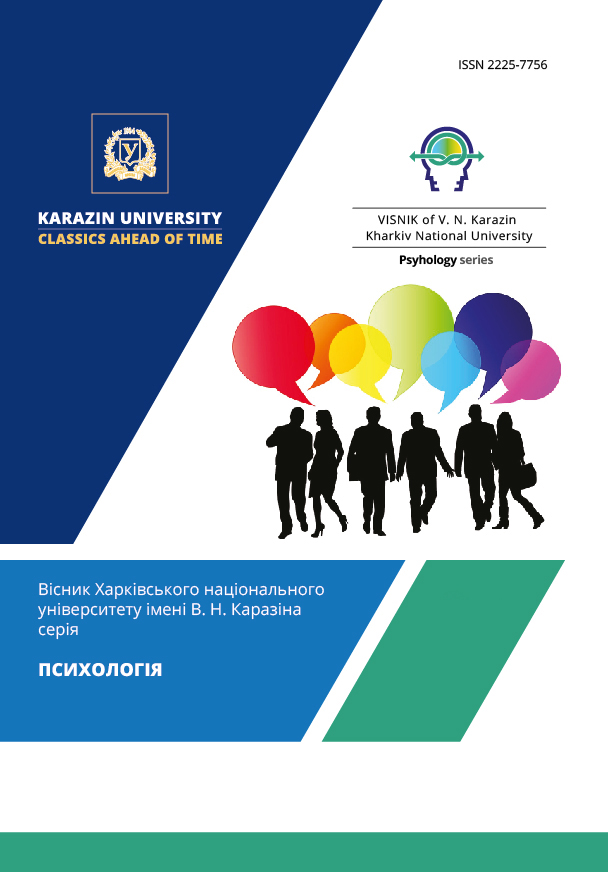THE TRANSFORMATIONS OF LIFE-SENSE ORIENTATIONS AS THE PART OF THE PERSONAL COMPONENT OF INDIVIDUAL EXPERIENCE OF PHILOLOGY AND PSYCHOLOGY FACULTY STUDENTS
Abstract
The article describes a research that aimed at deepening the understanding the personal experience organization. Individual experience is viewed from the standpoint of O. Laktionov's model, and it`s personal component is considered in detail. One of the parts of this component is the life-sense orientations, and the article analyzes the transformations of this phenomenon that took place from 2010 to 2017.
The personal component of individual experience contains three aspects: the oneself interpretation, the others interpretation, and the world interpretation. The aspect of oneself interpreting as value contains self-esteem, self-regulation, and the self-concept; the aspect of others interpreting as compatible with the subject of experience - the self-concept and values; aspect of the world interpretation - the values and life-sense orientations. The emphasis on the life-sense orientations within this article was made in view of the desire to find the most universal transformations of personal experience.
In the course of the empirical study, a comparative analysis of the subjects studied by the life-sense orientations (the test of life-orientation of D. Leontiev) in 2010 and 2017 using the U-Mann-Whitney test. To maximize the consideration of factors that could potentially affect the characteristics of the personal experience organization, the analysis was conducted separately on a sample of students-psychologists and students-philologists. The total number of persons who participated in the study was 121 students of V.N. Karazin Kharkiv National University (Kharkiv) and Donbass State Pedagogical University (Slovyansk).
Socio-political change was recognized as one of the key determinants of the transformations under study.
It was found that across the whole sample, compared to 2010, the level of expressiveness of meaningful life indicators, such as goal orientation, locus of control "I", locus of control of life, and overall meaningfulness of life, significantly decreased; at the same time, the level of result orientation was significantly increased.
Psychological students are characterized by a significant decrease in goal orientation, locus of self control, locus of life control, and overall meaningfulness of life; as well as an increase in result orientation. Philological students are characterized by a significant decrease in the locus of control of life and the overall meaning of life.
Downloads
References
Варфоломеева, Т. (2004). Динамика учебно-профессиональных установок студентов-психологов в процессе профессиональной подготовки в ВУЗе : автореф. дис. ... к. психол. наук : 19.00.05. Самара. 22 с.
Выготский, Л. (1982) Собрание сочинений в 6 т. / гл. ред. изд.: А. В. Запорожец. Москва : Педагогика. Т. 1. Вопросы теории и истории психологии.
Лактионов, А. (1998). Координаты индивидуального опыта. Харьков : Бизнес-Информ.
Леонтьев, А. (2004). Деятельность. Сознание. Личность : учебное пособие. Москва : Смысл: Академия.
Эльконин, Д. (1989). Избранные психологические труды. Москва : Педагогика.
Ядов, В. (2000). Стратегия социологического исследования: описание, объяснение, понимание социальной реальности. Москва : Добросвет.
Sevostianov, P. (2019). Openness to experience and behavior self-regulation in the structure of the personal component of individual experience. The Journal of V. N. Karazin Kharkiv National University. A Series of «Psychology», (65), 42-45.
Sevostianov, P. (2019). The theoretical foundations of the personal component of individual experience research. The Journal of V. N. Karazin Kharkiv National University. A Series of «Psychology», (66), 33-42. https://doi.org/10.26565/2225-7756-2019-66-04




